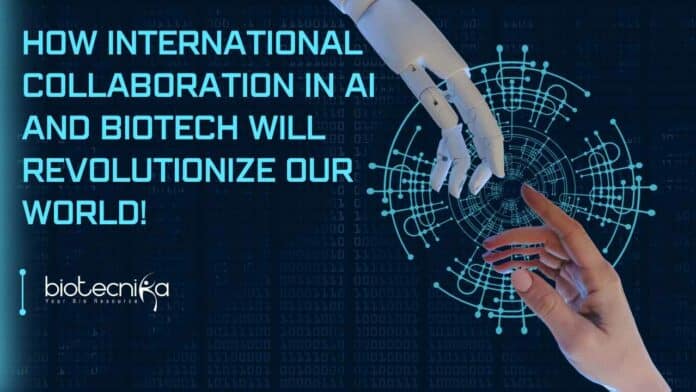The Need for International Collaboration in AI and Biotech
The imperative for global cooperation in AI and biotechnology is paramount in the swiftly evolving technological arena of today. Nations must come together to foster collaboration on emerging technologies like artificial intelligence (AI) and biotech. The convergence of machine learning and gene editing holds vast potential for transformative breakthroughs. However, without proper governance and international cooperation, these technologies may bring about unforeseen risks and leave nations behind in the global race for innovation. This article explores the importance of collaboration, proactive policy-making, and effective communication in harnessing the opportunities presented by AI and biotech.
The Convergence of AI and Gene Editing:
The convergence of machine learning and gene editing holds tremendous potential for various sectors, including medicine, agriculture, and aesthetics. For instance, algorithms can now be used to synthesize biofuels, beers, and bacteria through tools like ART. However, the lack of oversight in this area poses challenges. To fully leverage the benefits of this convergence, policymakers must take proactive measures.
The Role of Policy Development:
Policymaking in the field of gene editing has often been reactionary and focused on coping with new developments. However, more proactive approaches, particularly at the international
level, have been centered around ethics and the public good. To future-proof the advancements in AI and biotech, national governments, scientific communities, and international bodies must collaborate and adopt appropriate policy styles.The Need for International Cooperation:
While international bodies can exert influence, they require support at the national level to drive effective change. The scientific community can play a vital role in incentivizing collaboration by promoting active communication and fostering an environment where collaboration can thrive. Engaging with non-technical audiences, scientists and technologists can help shape public perception and understanding of new technologies.
Enhancing Communication and Transparency:
Increased communication and transparency between the technical community, national governments, and international stakeholders are essential. Initiatives like public dialogues and multidisciplinary roundtables can facilitate an informed understanding of complex topics like gene editing. Collaborating with existing international brokers, policymakers can draw on their expertise and resources for effective policy development.
Creating an Environment for International Collaboration:
Scientific communities and governments can work together to establish an environment conducive to well-planned and intentional policymaking. This can be achieved through education sessions, public media outreach, and the creation of links between international brokers and interested parties. By laying the foundations for increased collaboration, nations can collectively mitigate risks and capitalize on opportunities in convergent and emerging technologies.
Collaboration between nations is crucial in harnessing the transformative potential of AI and biotech. By adopting proactive policy styles, engaging in effective communication, and leveraging international resources and expertise, governments can pave the way for responsible and inclusive technology advancements. International collaboration is vital to avoid being left behind in the global race for innovation.
Keywords: AI, biotech, international collaboration, gene editing, machine learning, policy development, communication, transparency, innovation, responsible governance. Please ensure you are subscribed to the Biotecnika Times Newsletter and our YouTube channel to be notified of the latest industry news. Follow us on social media like Twitter, Telegram, Facebook



























